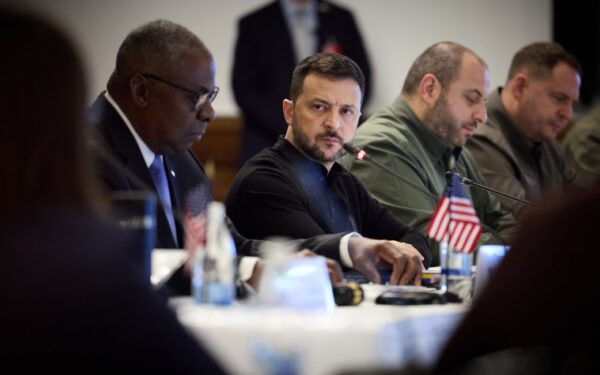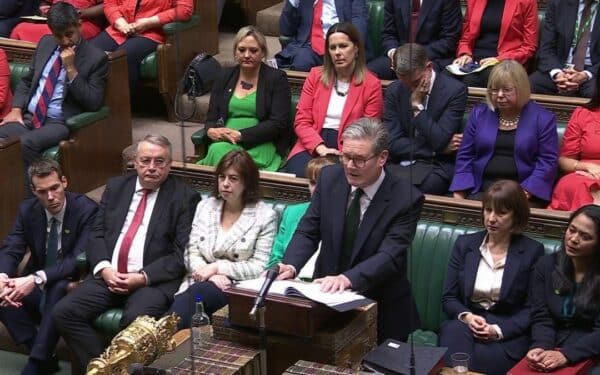After PMQs in the House of Commons on Wednesday 26 February, the former Chancellor of the Exchequer, Sajid Javid delivered a resignation statement. Here is a transcript of the full statement:
Thank you, Mr Speaker.
It has been eight years since I last stood to speak as a backbencher and it is a privilege to do so again.
When I left these benches it was to become a minister in the Treasury.
It seems apt that I have gone back to whence I came – the circle of life.
I am very proud to represent the good people of Bromsgrove and will, of course, continue to do so.
I will also continue to champion the causes I believe in most – albeit from outside government.
I confess I had hoped I would have a little longer to make a difference from the inside, so with thanks for your permission Mr Speaker, I thought it would be appropriate to briefly explain first to the House why I felt I had to resign as chancellor of the Exchequer.
I would also like to take this opportunity to thank all those colleagues in this chamber and beyond for their messages over the last two weeks.
And I’d like to thank my family too for their love and patience over the last few years.
I came into politics to give back to the country that has given me so much.
And, while I do not intend this to be the last chapter of my time in public life, in whatever form that takes, I am immensely grateful for the trust and support of colleagues in the roles I’ve had.
After first holding two ministerial positions within the Treasury, and before returning as chancellor, I had the huge privilege of leading four departments.
Each taught me more than the last, and shaped my understanding of government.
I can look back and say to myself very sincerely that I’ve never once made a decision, or given advice on a decision, that I did not believe was in the national interest.
Britain’s democracy and economy are strong because of its institutions and its people.
Conservatives especially believe that no particular person — or even a government — has a monopoly on the best ideas.
It is through these checks and balances of credible institutions, be it the Treasury, the Bank of England, the Office of Budget Responsibility, or indeed this House, that we arrive at sensible decisions in the national interest.
When reflecting on the dynamic between No 10 and No 11, it is natural to look at past relationships.
There is no one size that fits.
Any model that works, or doesn’t, depends on the personalities involved just as much as the processes.
It depends on the mutual respect and trust that allows for constructive, creative tension between teams.
And in creating that dynamic it has always been the case that advisers advise, ministers decide – and ministers decide on their advisers.
I couldn’t see why the Treasury – with the vital role that it plays – should be the exception to that.
A chancellor, like all cabinet ministers, has to be able to give candid advice to a prime minister – so he is speaking truth to power.
I believed that the arrangement proposed would significantly inhibit that — it would not have been in the national interest.
So while I was grateful for the continued trust of the prime minister in wanting to reappoint me, I’m afraid that these were conditions I could not accept in good conscience.
Now I don’t intend to dwell further on the details and personalities,
The comings and goings, if you will.
Much of this commentary was just gossip and distraction, and now it is in the past.
I very much hope the new chancellor will be given the space to do his job without fear or favour.
And I know that my RHF for Richmond is more than capable of rising to the challenge.
He worked for me as local government minister and chief secretary, and I couldn’t have asked for a better working relationship.
Indeed I had lobbied the PM for him to be given the role as chief secretary, and then to keep it at the recent reshuffle — although I didn’t quite get my way on that one.
My RHF the prime minister has won a huge mandate to transform our country.
And, already, he is off to a great start: ending the parliamentary paralysis, defeating the radical Left, getting Brexit done, a points-based immigration system and an infrastructure revolution.
Our party, our government, now has a huge opportunity — and responsibility — ahead.
We need a resolute focus on long-term outcomes and delivery, not short-term headlines.
The Treasury as an institution, as an economic ministry, should be the engine that drives our new agenda.
And since last summer, it has done just that.
From planning properly for Brexit to bringing in a generational step-change in infrastructure investment.
From rewriting the Green Book to better favour our regions to long-term thinking on human capital and designing the blueprint for levelling up across our country.
I’m incredibly proud of the scale and speed of work that has already been done.
But the Treasury must also be allowed to play its role as a finance ministry with the strength and credibility that it requires.
I’m a proud low-tax Conservative, and I always will be.
Already, our tax burden is the highest it’s been in 50 years.
It’s fair to say that not everyone in the centre of government feels the pressure to balance the books.
It was ever thus.
But the Treasury has a job to do.
It is the only tax-cutting ministry.
Every other department has an in-built incentive to seek and spend ever more money — not that I did that when I ran departments, of course!
But trade-offs have to be made somewhere.
At a time when we need to do much more to level up across the generations, it would not be right to pass the bill for our day-to-day consumption to our children and grandchildren.
And, unlike the US, we don’t have the fiscal flexibility that comes with a reserve currency.
So that’s why the fiscal rules that we were elected on are critical.
To govern is to choose.
And these rules crystallise the choices that are required: to keep spending under control, to keep taxes low, to root out waste, and to pass the litmus test — rightly set in stone in our manifesto — of debt being lower at the end of the parliament.
While I am, of course, disappointed not to be finishing what I started, I look to the future not with apprehension, but with great optimism.
We on these benches we have a shot at achieving nothing less than wholesale renewal, for our economy, our society and for our country.
A chance to give everyone an opportunity to live up to their full potential, wherever they live and whatever their background.
A chance to put people, place and social justice at the heart of a more human capitalism, and to bring our country together as One Nation.
Mr Speaker, I know that this is a shared vision, and I firmly believe that my RHF the prime minister has the tenacity, the energy and the skill to see it through.
I want to leave the House in no doubt that he has my full confidence, and the Government (has) my full support, to get it done.



